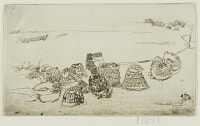Lobster Pots - Selsea Bill | ||
| Number: | 241 | |
| Date: | 1880/1881 | |
| Medium: | etching and drypoint | |
| Size: | 121 x 203 mm | |
| Signed: | butterfly at lower right | |
| Inscribed: | 'Selsea Bill' | |
| Set/Publication: | 'Second Venice Set', 1886 | |
| No. of States: | 4 | |
| Known impressions: | 32 | |
| Catalogues: | K.235; M.233; W.174 | |
| Impressions taken from this plate (32) | ||
TECHNIQUE
Whistler began the plate in pure etching and added just a few drypoint touches to the background to indicate sailing vessels and figures. It is clear that the drypoint details were added, rather than removed as Kennedy had thought, because traces of those lines are visible on impressions taken from the plate after it had been cancelled.
PRINTING
No impressions of the first state of Lobster Pots - Selsea Bill have been located, but impressions of the second state are in black ink, including ones on ivory laid paper watermarked with a crown over '1852' ( ) and beige laid paper with a partial crown watermark (
) and beige laid paper with a partial crown watermark ( ). Third states, still in black ink, are on cream laid paper with an indistinct '4WR' watermark (
). Third states, still in black ink, are on cream laid paper with an indistinct '4WR' watermark ( ) and beige laid paper with a partial crown watermark (
) and beige laid paper with a partial crown watermark ( ). 9
). 9
 ) and beige laid paper with a partial crown watermark (
) and beige laid paper with a partial crown watermark ( ). Third states, still in black ink, are on cream laid paper with an indistinct '4WR' watermark (
). Third states, still in black ink, are on cream laid paper with an indistinct '4WR' watermark ( ) and beige laid paper with a partial crown watermark (
) and beige laid paper with a partial crown watermark ( ). 9
). 9 9: Printing list, GUW #08717.
Lobster Pots - Selsea Bill was published by Messrs Dowdeswell and Thibaudeau with A Set of Twenty-six Etchings (the 'Second Venice Set') in 1886. There are numerous dockets, receipts and lists recording the printing and delivery of the edition. Twelve impressions of Lobster Pots - Selsea Bill were delivered on 28 July, two on 20 August, eleven on 21 October and eight on 26 October 1886, making a total of 36. 10
10: Whistler to W. Dowdeswell, [16 July 1887], GUW #08717.
Later impressions - all of the fourth state - were printed in dark brown ink on a variety of papers: ivory laid paper with a foolscap watermark ( ); cream 'antique' (pre-1800) laid, possibly with part of a Strasbourg Lily 'VG' watermark (
); cream 'antique' (pre-1800) laid, possibly with part of a Strasbourg Lily 'VG' watermark ( ); ivory laid with a partial watermark, 'WR' (
); ivory laid with a partial watermark, 'WR' ( ); and Asian laid paper (
); and Asian laid paper ( ). Several were printed in brown (
). Several were printed in brown ( ,
,  ,
,  ) or black ink (
) or black ink ( ,
,  ,
,  ) on ivory laid paper. Others are in black ink on buff laid paper (
) on ivory laid paper. Others are in black ink on buff laid paper ( ), and fine light-weight cream laid (
), and fine light-weight cream laid ( ). A cancelled impression is in black ink on a heavy-weight ivory laid paper (
). A cancelled impression is in black ink on a heavy-weight ivory laid paper ( ).
).
 ); cream 'antique' (pre-1800) laid, possibly with part of a Strasbourg Lily 'VG' watermark (
); cream 'antique' (pre-1800) laid, possibly with part of a Strasbourg Lily 'VG' watermark ( ); ivory laid with a partial watermark, 'WR' (
); ivory laid with a partial watermark, 'WR' ( ); and Asian laid paper (
); and Asian laid paper ( ). Several were printed in brown (
). Several were printed in brown ( ,
,  ,
,  ) or black ink (
) or black ink ( ,
,  ,
,  ) on ivory laid paper. Others are in black ink on buff laid paper (
) on ivory laid paper. Others are in black ink on buff laid paper ( ), and fine light-weight cream laid (
), and fine light-weight cream laid ( ). A cancelled impression is in black ink on a heavy-weight ivory laid paper (
). A cancelled impression is in black ink on a heavy-weight ivory laid paper ( ).
).
